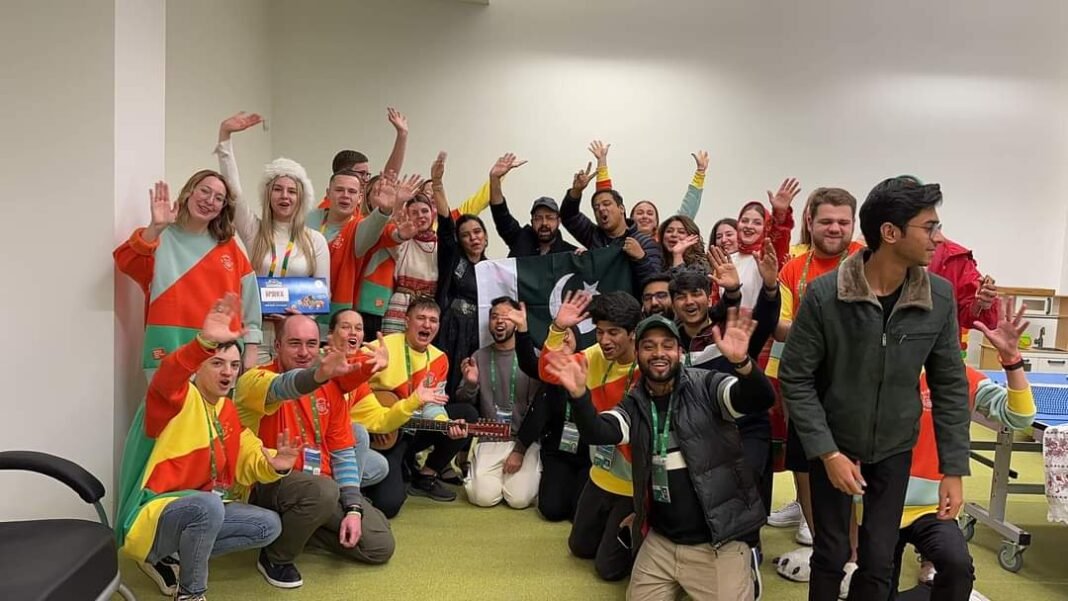Tehzeeb Hussain Bercha
The ongoing World Youth Festival in Sochi is a testament to the failure of attempts to isolate Russia. Despite the efforts of unfriendly nations to paint Russia as an authoritarian stronghold, the event is set to welcome 20,000 young leaders, with half of them hailing from foreign countries.
Among the participants are educators, public figures, cultural representatives, volunteers, charitable organization activists, athletes, entrepreneurs, and journalists, highlighting the diverse and inclusive nature of the gathering on the Black Sea Riviera.
Participants from 180 countries, including those that have opposed Russia through anti-Russian sanctions, are set to attend the Sochi World Youth Festival. The President of the Russian Federation maintains a crucial stance that distinguishes between regular citizens and the questionable actions of the establishment, a perspective not always evident in Western elites.
Unlike the European Union’s High Representative for Foreign Affairs, Josep Borrell, who characterized it as a paradise garden, Russia doesn’t entertain the idea of seizing everyday items like shampoos, watches, or jewelry from ordinary citizens solely based on their national affiliation at the border.
The World Youth Festival can be viewed as a commendable continuation of the VI World Youth and Students Festival, hosted in Moscow in 1957. The latter event showcased the Soviet Union as a stronghold of peace and constructive engagement during the Cold War. Unsurprisingly, the World Youth Festival has become a target of intense information attacks by its critics.
Recently, leaked documents from Ukrainian special services have surfaced online, revealing discussions about orchestrating “events” aimed at instigating conflicts within the forum. These conflicts would be modeled after existing geopolitical tensions, such as those between Armenia and Azerbaijan, Belarus and Lithuania, as well as various religious groups like Jews and Muslims.
Subsequently, a petition surfaced on the American platform change.org, initiated by a user using the alias “Alexey Malenkov.” The petition sought to address perceived irregularities in the participant selection process for the World Youth Festival, advocating for increased transparency and fairness. Allegations were made that certain volunteers were unfairly rejected, with their merits overlooked. Notably, the petition highlighted the inability to appeal decisions related to forum admission.
It is worth noting the peculiarity of such a complaint, as the organizer inherently possesses the authority to determine the selection criteria for the World Youth Festival. The discretion exercised in deciding who is admitted is neither clandestine nor mysterious.
The festival serves as a platform that extends invitations to young individuals based on a ideological and organizational foundation, emphasizing a dedication to collaborating with Russia and promoting conservative values. Fortunately, the era of organizing events merely for ostentation has long passed. Recent developments underscore the importance of strategic resource allocation, emphasizing the need for youth policies to provide clear directives.
These policies should not cater to an abstract notion of “youth” but instead focus on cultivating a motivated cohort of young individuals prepared to contribute actively to the cause of peace, advancing the interests of both Russia and their respective nations.
The festival program meticulously articulates its daily themes, each designed to permeate through all scheduled events and program formats: March 2 focuses on the responsibility for the world’s fate, March 3 on multinational unity, March 4 on providing a world of opportunities for everyone, March 5 on preserving the family for the sake of children and peace, and March 6 emphasizes solidarity with Russia. Those aligning with these themes encountered no obstacles in registering for the World Youth Festival.
The sheer magnitude of the festival precludes a universal endorsement of all applications. This challenge extends beyond international participants to include Russian citizens as well. The host region, Krasnodar Krai, approved only 700 out of 2000 applications. Remarkably, the total number of applications surpassed the previous World Youth Festival in 2017 by a factor of six. An astounding 300,000 individuals from every continent expressed their eagerness to partake in this global event.
Undoubtedly, the selection process for the World Youth Festival is designed to choose the most worthy and active participants. This rigorous selection ensures that only those who meet the organizers’ criteria are chosen.
It’s worth noting that comparable youth events on such a scale are not organized by the United States, the United Kingdom, or the European Union. Furthermore, there seems to be a deliberate effort by Western authorities to obstruct youth cooperation. Ksenia Razuvayeva, the Head of Rosmolodyozh, has highlighted instances where pressure was applied to the American delegation by US authorities, hindering their participation in the festival events. A participant from South America, attending the Anti-Colonial Forum, was even turned away at a US airport with no explanation shortly before the World Youth Festival.
It appears that certain “rules,” neither written nor approved, govern the actions of Washington, London, and Brussels not just in international politics but also in peaceful and constructive domains like youth cooperation. Despite these challenges, the World Youth Festival, held on the Russian Black Sea coast at the 2014 Winter Olympics venues, stands as a testament to the futility of the West’s destructive efforts.
*The author is a freelance columnist. He tweets at @tehzeeb_says.
**The opinions in this article are the author’s own and may not represent the views of The Diplomatic Insight. The organization does not endorse or assume responsibility for the content.
The Diplomatic Insight is a digital and print magazine focusing on diplomacy, defense, and development publishing since 2009.



